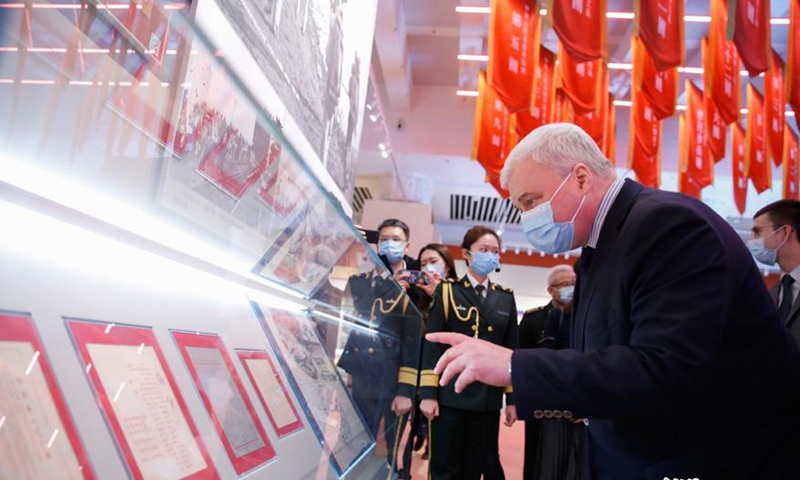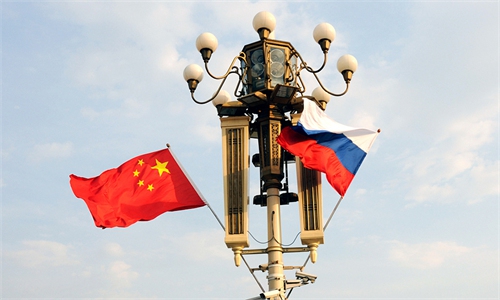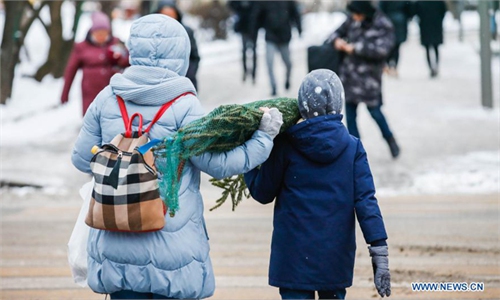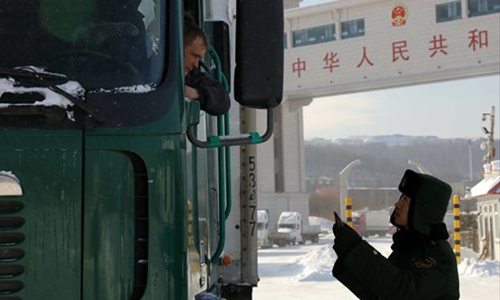
Russia's ambassador to China Andrei Denisov visits an exhibition commemorating the 70th anniversary of the Chinese People's Volunteers forces entering the Democratic People's Republic of Korea to help in the war to resist U.S. aggression at the Military Museum of the Chinese People's Revolution in Beijing, Nov. 3, 2020. (Photo: China News Service/Jiang Qiming)
Russia hopes President Vladimir Putin will be the first foreign head of state to visit China when the COVID-19 pandemic is contained, said Russian Ambassador to China Andrey Ivanovich Denisov at a media briefing on Tuesday.
Ambassador Denisov told the Global Times on Tuesday that the upcoming Biden administration in the US will not have any effect on the strong Russia-China ties.
China and Russia have a tradition of reciprocal state visits. Due to the pandemic, Putin was unable to visit China this year, but the leaders of the two countries maintained close communication through phone calls and written messages, the ambassador said.
On Monday, Chinese President Xi Jinping spoke with Putin by telephone to exchange New Year greetings, the fifth phone call between the two heads of state this year.
Xi said on Monday that the two sides have supported each other in overcoming the current challenges and continued to firmly support each other on issues concerning each other's core interests, which demonstrated their high-level mutual trust and friendship.
Xi has met Putin more than 30 times since 2013 on bilateral and multilateral occasions, and the two leaders have made phone calls and written to each other many times, according to Russian media reports.
Asked about the potential impact of the incoming Biden administration on Russia-China relations, the ambassador told the Global Times that "Russia and China have formed a comprehensive strategic partnership of coordination. No external forces can shake the bilateral relations."
Under the Trump administration, China-US relations and Russia-US relations have been in gridlock, and the US should bear the full responsibility for it, he said.
"Russia and China have taken the necessary measures to avoid this. But the Trump administration has nonetheless soured the China-US and Russia-US relations to the current state," he added.
"We hope the upcoming US administration can adopt a rational attitude toward Russia and China. We need to wait and see the next move by the US government," he said.
The ambassador said he has been observing China-US relations for a long time. The approach China takes in dealing with the US is "appropriate."
"The new US administration is about to be sworn in. Russia and China have made it clear that they are willing to cooperate with the new US administration and start new contacts to improve the current situation. We look forward to that, but it's a hope, and it depends on what the US government will do next. It's entirely up to the US government," he said, stressing again that the new administration will not have any impact on Russia-China relations.
"We have great expectations for 2021. We hope 2021 could be a more rational year in the international situation. We hope for more cooperation, instead of confrontation," the diplomat said.
In October, Putin said there is no need for a Russia-China military alliance, but the possibility should not be ruled out in the future.
Asked about the possible Russia-China military alliance, the ambassador said a basic and common judgment from experts in both Russia and China is that a political and military alliance does not fit the current Russia-China relations.
First, bilateral relations between Russia and China are not aimed at any third party. Second, both countries are opposed to the "bloc thinking." Both countries are independent on the international platform, which is also in line with the multilateralism advocated by both countries, he said.
In the normal alliance relations, there is always a dominant country even if the alliance claimed all members are equal, the Ambassador cited NATO as an example. "It goes against the values of China and Russia in developing relationship," he said.
In many areas, Russia-China relations have in fact gone beyond the traditional alliance relationship. In the military field, both sides have many concrete examples of cooperation. "It can go further if necessary," said the diplomat.



